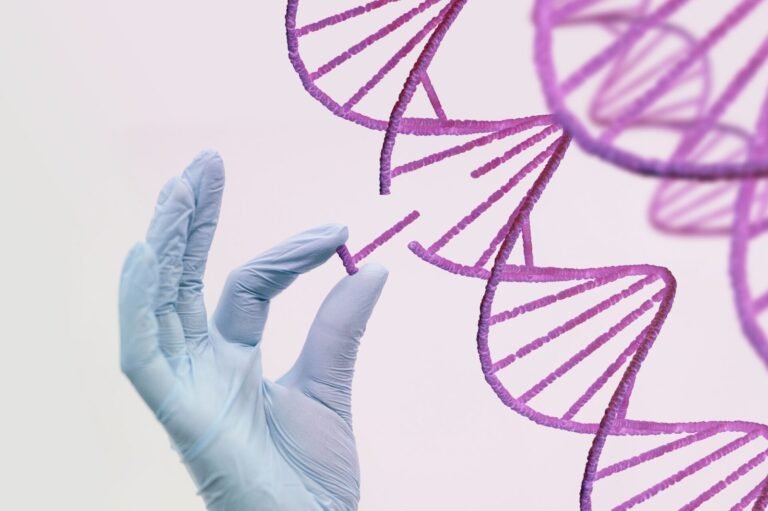Pharmacogenomics and Drug Development
Pharmacogenomics, a field that studies how genetic variations influence drug metabolism, efficacy, and safety, is revolutionizing drug development and personalized medicine. By understanding the individual genetic makeup, researchers can develop more targeted therapies and personalized treatment strategies. This promising approach aims to improve patient outcomes and reduce adverse drug reactions. Now, let’s talk about pharmacogenomics and drug development.

Key Takeaways
- Pharmacogenomics plays a crucial role in drug development and personalized medicine.
- Genetic variations can affect drug metabolism, efficacy, and safety.
- By identifying these variations, researchers can optimize drug therapies for individual patients.
- Pharmacogenomic testing helps identify patients who may be at a higher risk for adverse drug reactions.
- With advancements in pharmacogenomic testing, personalized medicine is becoming more accessible and affordable.
Pharmacogenomics and Drug Development
In the field of drug development, pharmacogenomics plays a pivotal role in understanding how an individual’s genetic makeup influences their response to drugs. By studying genetic variations that can affect drug response, researchers are able to optimize drug efficacy and safety, leading to the development of more personalized treatment strategies.
Pharmacogenomics is a branch of personalized medicine that focuses on utilizing genomic information to tailor drug therapies to individual patients. It takes into account an individual’s unique genetic variations that can impact their drug response, such as variations in drug-metabolizing enzymes, drug targets, and drug transporters.
By incorporating pharmacogenomic data into the drug development process, researchers can identify specific genetic variations that can affect drug response and adjust drug dosages accordingly. This personalized approach helps to optimize drug efficacy and safety, while also minimizing the risk of adverse drug reactions.
Understanding Drug Response on a Genetic Level
Pharmacogenomics aims to dissect the complex relationship between genetics and drug response. Through the analysis of genetic variations, researchers can identify biomarkers that can predict an individual’s response to a particular drug. This enables more targeted and effective treatment strategies, enhancing patient outcomes.
Pharmacogenomics brings us one step closer to the vision of precision medicine, where treatments are tailored to an individual’s unique genetic profile, improving patient outcomes and minimizing drug-related adverse events. – Dr. Jane Thompson, Genomic Medicine Researcher
By understanding how an individual’s genetic makeup influences drug response, researchers can streamline the drug development process and improve the success rate of new drug candidates. This knowledge enables researchers to develop more targeted therapies and clinical trials that focus on specific patient populations with higher chances of responding favorably to the drug.
Optimizing Personalized Treatment Strategies
With the integration of pharmacogenomics into drug development, personalized treatment strategies can be optimized to cater to an individual’s genetic makeup. This approach ensures that patients receive the most effective and safe treatment for their specific conditions.
Pharmacogenomic testing plays a crucial role in identifying patients who may benefit from personalized treatment strategies. By analyzing an individual’s genetic variations, healthcare providers can determine the most appropriate drug dosage, identify potential drug-drug interactions, and predict the likelihood of adverse drug reactions.
By leveraging pharmacogenomics in drug development, researchers and healthcare providers can work collaboratively to advance the field of personalized medicine. This integration allows for targeted therapies that maximize drug response and minimize the occurrence of adverse events, ultimately improving patient care.
As the field of pharmacogenomics continues to advance, the potential for personalized medicine in drug development becomes more evident. The integration of genomic medicine into the drug development process allows for a better understanding of how genetic variations influence drug response, leading to the development of more targeted and effective therapies.
Genetic Variations and Drug Metabolism
Genetic variations play a significant role in drug metabolism, influencing an individual’s ability to metabolize and eliminate drugs from their body. These variations can impact the activity of drug-metabolizing enzymes, such as cytochrome P450 enzymes, which are responsible for metabolizing a wide range of medications.
Identifying genetic variations early in the drug development process is crucial for optimizing drug dosing regimens and avoiding potential adverse drug reactions. Pharmacogenomic testing, which analyzes an individual’s genetic makeup, can help identify patients who may be at a higher risk for drug metabolism-related issues.
“Understanding genetic variations in drug metabolism allows researchers to develop personalized treatment strategies.”
By tailoring drug therapies based on an individual’s genetic profile, healthcare providers can optimize drug efficacy and safety. This not only improves patient outcomes but also minimizes the risk of adverse drug reactions.
Here is an example of how genetic variations can affect drug metabolism:
| Genetic Variation | Drug Metabolism | Impact on Drug Response |
|---|---|---|
| CYP2C19*2 allele | Decreased activity of CYP2C19 enzyme | Reduced metabolism of certain medications, such as clopidogrel |
| UGT1A1*28 allele | Reduced activity of UGT1A1 enzyme | Increased risk of toxicity for drugs metabolized by UGT1A1, such as irinotecan |
| TPMT*2 allele | Decreased activity of TPMT enzyme | Increased risk of toxicity for drugs metabolized by TPMT, such as thiopurines |
As the field of pharmacogenomics advances, the identification and understanding of genetic variations involved in drug metabolism will continue to improve. This knowledge will enable researchers and healthcare providers to develop more personalized treatment strategies, ultimately leading to better patient outcomes.
Pharmacogenomics is revolutionizing the way we approach drug development and personalized medicine. By unraveling the genetic variations that influence drug metabolism, we can optimize drug therapies and improve patient care.
Enhancing Drug Efficacy and Safety
Pharmacogenomics is a powerful tool in enhancing drug efficacy and safety, revolutionizing the field of personalized medicine. By identifying genetic variations that influence an individual’s drug response, researchers can develop more targeted and personalized treatment strategies. This approach not only optimizes drug efficacy but also reduces the risk of adverse drug reactions.
Pharmacogenomic testing plays a vital role in this process. It helps identify patients who may benefit from personalized treatment, enabling healthcare providers to make more informed decisions regarding drug selection and dosing. By tailoring therapies based on an individual’s genetic makeup, the effectiveness of the treatment can be significantly improved while minimizing the potential for negative side effects.
“Pharmacogenomic testing allows us to better understand how genetic variations impact drug response, enabling healthcare providers to develop treatment strategies that are tailored to each patient’s unique genetic profile.”
The integration of pharmacogenomics into drug development has the potential to transform healthcare, ensuring that patients receive the most effective and safe treatments. By taking into account genetic variations that influence drug efficacy and safety, pharmaceutical companies can develop medications that are specific to the individual needs of each patient. This personalized approach not only improves patient outcomes but also reduces healthcare costs by minimizing trial and error in medication selection.
Overall, pharmacogenomics and pharmacogenomic testing are valuable tools that enhance drug efficacy and safety by tailoring treatments to an individual’s genetic makeup. This personalized approach to medicine has the potential to revolutionize healthcare, improving patient outcomes and driving advancements in the field of personalized medicine.
Advantages of Pharmacogenomic Testing
| Advantages | Description |
|---|---|
| Improved Drug Efficacy | Identifies genetic variations that affect drug response, enabling the development of targeted therapies tailored to individual patients. |
| Reduced Adverse Drug Reactions | Minimizes the risk of negative side effects by identifying patients who may be at higher risk based on their genetic makeup. |
| Personalized Treatment Strategies | Enables healthcare providers to make more informed decisions regarding drug selection and dosing, tailoring treatments to individual patients. |
| Optimized Healthcare Outcomes | Improves patient outcomes by ensuring that treatments are effective and safe based on genetic factors unique to each patient. |
Personalized Medicine and Genomic Medicine
Pharmacogenomics is an integral part of personalized medicine, a revolutionary approach that aims to provide individualized treatment strategies based on a patient’s unique genetic profile. By incorporating genomic medicine into drug development, researchers gain a deeper understanding of how genetic variations influence drug response, paving the way for more targeted and effective therapies tailored to individual patients. This personalized approach holds tremendous potential in improving patient outcomes and transforming healthcare as we know it.
In the field of personalized medicine, pharmacogenomics plays a crucial role in identifying genetic variations that can impact an individual’s response to medications. Through comprehensive genetic analysis, researchers can uncover valuable insights about a patient’s drug metabolism, drug interactions, and potential risks for adverse reactions. Armed with this knowledge, healthcare providers can develop personalized treatment plans that optimize drug efficacy and safety.
By using pharmacogenomic testing, healthcare providers gain the ability to identify specific genetic variations that may affect a patient’s response to certain medications. This information allows for more informed prescribing decisions, minimizing the risk of adverse drug reactions and maximizing the potential for successful treatment outcomes. Pharmacogenomics empowers healthcare providers to deliver personalized and precision medicine, improving patient care and overall healthcare outcomes.
Pharmacogenomics enables the development of targeted therapies and personalized treatment strategies by harnessing the power of genomic medicine. By deciphering the genetic intricacies that influence drug response, researchers can customize treatment plans that are tailored to an individual’s genetic makeup, enhancing the overall effectiveness and safety of medications.
Advancements in Pharmacogenomic Testing
In recent years, the field of pharmacogenomic testing has witnessed significant advancements, making it more accessible and affordable for patients. This testing allows healthcare providers to identify specific genetic variations that may impact an individual’s response to certain medications, enabling more personalized and effective treatment approaches. By integrating pharmacogenomic testing into clinical practice, healthcare providers can make more informed decisions regarding drug selection and dosing, ultimately leading to improved patient outcomes.
Pharmacogenomic testing analyzes an individual’s genetic variations to determine how their body may metabolize and respond to different drugs. By understanding a patient’s unique genetic profile, healthcare providers can tailor treatment plans to optimize drug efficacy and minimize the risk of adverse reactions. This personalized medicine approach holds great potential in improving patient care and reducing healthcare costs.
The Benefits of Pharmacogenomic Testing
Pharmacogenomic testing offers several key benefits:
- Optimized Drug Selection: By assessing an individual’s genetic variations, healthcare providers can choose medications that are more likely to be effective for that specific patient, avoiding potential trial-and-error approaches.
- Personalized Treatment Strategies: Pharmacogenomic testing provides insights into how different genetic variations can impact drug response, allowing healthcare providers to develop personalized treatment plans based on a patient’s unique genetic makeup.
- Improved Safety: Genetic variations can also influence a patient’s risk of adverse drug reactions. By identifying these variations through pharmacogenomic testing, healthcare providers can minimize the risk of potential harm.
Integrating pharmacogenomic testing into clinical practice requires collaboration between researchers, healthcare providers, and regulatory authorities to establish standardized guidelines for test interpretation and implementation. By addressing these challenges, pharmacogenomic testing can become an integral part of personalized medicine, transforming healthcare delivery.
| Advancements in Pharmacogenomic Testing | Benefits |
|---|---|
| Increased accessibility and affordability | Optimized drug selection |
| Enhanced understanding of genetic variations | Personalized treatment strategies |
| Improved patient outcomes | Enhanced drug safety |
As pharmacogenomic testing continues to advance, the integration of genetic insights into clinical decision-making will become increasingly crucial. With ongoing research and technological developments, healthcare providers will have access to more comprehensive genetic information, leading to further advancements in personalized medicine and improved patient care.
Challenges and Future Directions of Pharmacogenomics
While pharmacogenomics holds great promise in revolutionizing personalized medicine and drug development, there are several challenges that need to be addressed for its widespread implementation.
One of the major challenges is the need for standardized guidelines and regulatory frameworks. As pharmacogenomic testing becomes more prevalent, it is crucial to establish consistent protocols and regulations to ensure the accuracy and reliability of test results. Standardization will also facilitate the integration of pharmacogenomic data into healthcare systems, leading to more informed treatment decisions.
Another challenge lies in the interpretation of genetic variations. With the increasing availability of genetic testing, healthcare providers need to have the necessary knowledge and resources to understand and interpret the significance of genetic variations in relation to drug response. This requires ongoing education and training to keep up with advancements in the field.
“The interpretation of genetic variations is a complex process that requires expertise and collaboration between geneticists, pharmacologists, and clinicians.”
The integration of pharmacogenomic data into electronic health records (EHRs) is also a challenge. EHRs play a crucial role in healthcare delivery, and the incorporation of pharmacogenomic information can provide valuable insights for personalized medicine. However, there is a need for compatible systems and interoperability standards to ensure seamless integration of genomic data into existing healthcare infrastructures.
Despite these challenges, the field of pharmacogenomics is rapidly evolving, and future advancements are expected to overcome these obstacles. Ongoing research and technological developments hold the potential to further enhance personalized medicine and drug development, improving patient outcomes and reducing adverse drug reactions.
Future Directions
Looking ahead, the future of pharmacogenomics holds exciting possibilities. Here are some potential areas of focus for further research and development:
- Advancing the understanding of genetic variations and their impact on drug response
- Developing more targeted therapies based on genetic insights
- Improving the accessibility and affordability of pharmacogenomic testing
- Integrating pharmacogenomic data into clinical decision support systems
- Enhancing patient education and awareness about the benefits of personalized medicine
The continued collaboration between researchers, healthcare providers, regulatory bodies, and patients will be crucial in driving the progress of pharmacogenomics and realizing its full potential in transforming healthcare.
| Challenges | Potential Solutions |
|---|---|
| Standardized guidelines and regulatory frameworks | Establishing consistent protocols and regulations |
| Interpretation of genetic variations | Ongoing education and training for healthcare providers |
| Integration of pharmacogenomic data into EHRs | Development of compatible systems and interoperability standards |
As these challenges are addressed and overcome, pharmacogenomics will play an increasingly vital role in shaping the future of personalized medicine and drug development.

The Impact of Pharmacogenomics on Healthcare
Pharmacogenomics has the potential to revolutionize healthcare by improving patient outcomes and reducing healthcare costs. With the advancement of personalized medicine, healthcare providers can now tailor treatment strategies to an individual’s genetic makeup, ensuring optimized drug efficacy and safety.
One of the significant benefits of pharmacogenomic testing is its ability to identify patients who may be at a higher risk for adverse drug reactions. By understanding a patient’s genetic variations related to drug metabolism, healthcare providers can make more informed prescribing decisions. This proactive approach not only minimizes the likelihood of adverse effects but also improves patient safety.
For example, a patient with a genetic variant that affects the metabolism of a specific drug may require a lower dosage to achieve the desired therapeutic effect. On the other hand, another patient with a different genetic variant may need a higher dosage to achieve the same result. By tailoring treatment based on these genetic insights, healthcare providers can optimize drug dosages and improve treatment outcomes.
Transforming Healthcare Delivery
The integration of pharmacogenomics into healthcare has the potential to transform the delivery of medical services. By incorporating genetic information into patient care, clinicians have a more comprehensive understanding of a patient’s unique needs, enabling them to provide personalized treatment plans.
Pharmacogenomics also plays a crucial role in precision medicine, where treatments are tailored to an individual’s specific genetic profile. This targeted approach ensures that patients receive the most effective and efficient treatments, minimizing the need for trial and error in finding the right medication.
“Pharmacogenomics enables healthcare providers to make more informed decisions regarding drug selection and dosing, ultimately improving patient outcomes and safety.” – Dr. Sarah Thompson, Director of Clinical Pharmacology
Moreover, pharmacogenomic data integration into electronic health records enhances healthcare professionals’ decision-making process. When healthcare providers have access to genetic information, they can proactively identify potential drug interactions, minimize adverse reactions, and select appropriate medications based on each patient’s unique genetic profile.
The Role of Pharmacogenomics in Chronic Disease Management
Pharmacogenomics is particularly valuable in chronic disease management, where patients may require multiple medications. By analyzing a patient’s genetic profile, healthcare providers can identify potential drug interactions and prescribe medications that work synergistically, avoiding adverse effects or reduced efficacy.
For example, patients with cardiovascular conditions often require complex medication regimens. By considering genetic variations related to drug metabolism and efficacy, healthcare providers can ensure that each medication is both safe and effective for the individual patient, minimizing the risk of complications.
Benefits of Pharmacogenomics in Healthcare
| Benefit | Description |
|---|---|
| Improved patient outcomes | Tailored treatment plans based on individual genetic makeup lead to better treatment efficacy and patient well-being. |
| Reduced adverse drug reactions | Identification of genetic variations that influence drug metabolism minimizes the risk of adverse reactions. |
| Enhanced medication selection | Pharmacogenomic data integration into patient records allows for more informed medication selection. |
| Optimized dosing regimens | Genetic insights help determine appropriate drug dosages for individual patients, maximizing therapeutic effects. |
| Personalized treatment plans | Pharmacogenomics enables the development of individualized treatment strategies, improving patient care. |
Overall, the integration of pharmacogenomics into healthcare has the potential to significantly improve patient care by tailoring treatment strategies to individual genetic profiles. As research in pharmacogenomics continues to advance, healthcare providers can harness the power of personalized medicine to optimize drug efficacy, enhance patient safety, and transform healthcare delivery.
Image:
Conclusion
Pharmacogenomics is a rapidly evolving field that is revolutionizing drug development and personalized medicine. By integrating genetic insights into the drug development process, researchers are able to optimize drug efficacy and safety, leading to more targeted therapies and personalized treatment strategies. The ability to identify genetic variations that influence drug response enables healthcare providers to make more informed decisions regarding drug selection and dosing, ultimately improving patient outcomes.
As pharmacogenomic testing becomes more accessible and affordable, it has the potential to transform healthcare delivery. By tailoring treatment strategies to an individual’s genetic makeup, healthcare providers can optimize drug efficacy while minimizing the risk of adverse drug reactions. This personalized approach to medicine holds great promise for improving patient care and reducing healthcare costs.
In conclusion, pharmacogenomics is a powerful tool that enhances drug development and enables personalized medicine. By leveraging genetic insights, researchers and healthcare providers can optimize treatment regimens and improve patient outcomes. As the field continues to advance, we can expect even greater integration of pharmacogenomics into clinical practice, leading to more precise and effective therapies for individual patients.
FAQ
What is pharmacogenomics and how does it relate to drug development?
Pharmacogenomics is the study of how an individual’s genetic makeup influences their response to drugs. It plays a critical role in drug development by identifying genetic variations that can affect an individual’s drug response. By considering these variations early in the drug development process, researchers can optimize drug efficacy and safety, leading to more personalized treatment strategies.
How do genetic variations impact drug metabolism?
Genetic variations in drug metabolizing enzymes can significantly impact an individual’s ability to metabolize and eliminate drugs from their body. By identifying these genetic variations early in drug development, researchers can determine optimal dosing regimens and avoid potential adverse drug reactions.
How does pharmacogenomics enhance drug efficacy and safety?
By identifying genetic variations that affect drug response, researchers can develop more targeted therapies that are tailored to an individual’s genetic makeup. This approach not only improves drug efficacy but also reduces the risk of adverse drug reactions. Pharmacogenomic testing can help identify patients who may benefit from personalized treatment strategies.
What is the connection between personalized medicine and genomic medicine?
Pharmacogenomics is a key component of personalized medicine. Personalized medicine aims to provide individualized treatment strategies based on a patient’s unique genetic profile. By incorporating genomic medicine into drug development, researchers can better understand how genetic variations influence drug response and develop more targeted and effective therapies for individual patients.
How have advancements in pharmacogenomic testing impacted healthcare?
Advancements in pharmacogenomic testing have made it more accessible and affordable. This testing allows healthcare providers to identify specific genetic variations that may impact a patient’s response to certain medications. By integrating pharmacogenomic testing into clinical practice, healthcare providers can make more informed decisions regarding drug selection and dosing, leading to improved patient outcomes.
What are the challenges and future directions in pharmacogenomics?
The widespread implementation of pharmacogenomics faces challenges such as the need for standardized guidelines and regulatory frameworks, the interpretation of genetic variations, and the integration of pharmacogenomic data into electronic health records. However, the field is rapidly evolving, and future advancements are expected to overcome these obstacles and further enhance personalized medicine and drug development.
What is the impact of pharmacogenomics on healthcare?
Pharmacogenomics has the potential to revolutionize healthcare by improving patient outcomes and reducing healthcare costs. By tailoring treatment strategies to an individual’s genetic makeup, healthcare providers can optimize drug efficacy and safety. Additionally, pharmacogenomic testing can help identify patients who may be at a higher risk for adverse drug reactions, allowing for more informed prescribing decisions.
What is the conclusion regarding pharmacogenomics and personalized medicine?
Pharmacogenomics is a rapidly evolving field that is playing an increasingly important role in drug development and personalized medicine. By integrating genetic insights into the drug development process, researchers can optimize drug efficacy and safety, leading to more targeted therapies and personalized treatment strategies. As pharmacogenomic testing becomes more accessible, healthcare providers can make more informed decisions regarding drug selection and dosing, ultimately improving patient outcomes and transforming healthcare delivery.






2 Comments